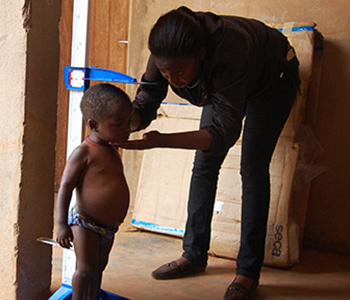Current Projects:
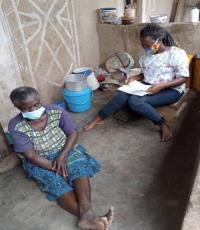
Condiment Micronutrient Innovation Trial (CoMIT) Project
The Condiment Micronutrient Innovation Trial (CoMIT) project focuses on evaluating multiple micronutrient-fortified bouillon cubes as a strategy to address micronutrient deficiencies. The two main objectives of the project are: 1) to test the impact of household use of multiple micronutrient-fortified bouillon, compared to control bouillon, on micronutrient status among women and young children in northern Ghana in a randomized, controlled trial; and 2) assess the effective coverage and cost-effectiveness of this new micronutrient delivery vehicle vis à-vis other (traditional) vehicles and micronutrient programs at national and regional levels using the MINIMOD-SD tool (Micronutrient Intervention Modeling project tool, developed based on secondary data). The project is funded by Helen Keller International and includes partnerships with University of Ghana, Newcastle University, Pennsylvania State University, and Johns Hopkins University.
Contact: Reina Engle-Stone, PhD
International Lipid-Based Nutrient Supplements (iLiNS) Project
Small-Quantity Lipid-Based Nutrient Supplements (SQ-LNS)
The International Lipid-Based Nutrient Supplements (iLiNS) Project is a research collaboration that grew out of a shared commitment to accelerate progress in preventing malnutrition. We are conducting research projects in Burkina Faso, Ghana, and Malawi. Previous work with lipid-based nutrient supplements (LNS) in Ghana and Malawi indicated that such supplements could improve child growth and development in low-income populations. The iLiNS Project was designed to build on the previous work. We will evaluate the efficacy of new and less costly formulations, study the impact of providing LNS to pregnant and lactating women, and explore the economic dimensions of LNS used to prevent malnutrition.
Contact: Kathryn Dewey, PhD
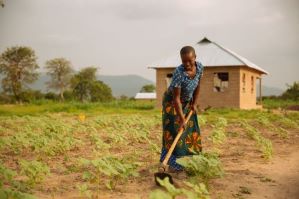
The FRESH Initiative
The Initiative on Fruit and Vegetables for Sustainable Healthy Diets, also known as FRESH, aims to use an end-to-end approach to increase fruit and vegetable intake and in turn improve diet quality, nutrition, and health, while also improving livelihoods, empowering women and youth, and mitigating environmental impacts.
The FRESH initiative is being implemented by the Consortium of International Agricultural Research Centers (CGIAR) researchers from the International Food Policy Research Institute (IFPRI), the Center for International Maize Research and Technology ((CIMMYT), The Alliance of Bioversity International and the International Center for Tropical Agriculture (CIAT), the International Water Management Institute (IWMI), and Clean in Place (CIP) in close partnership with World Vegetable Center, Applied Horticultural Research, the University of Sydney, the Institute of Development Studies, Wageningen University & Research, and the University of California, Davis, Borlaug Institute of South Asia, Sokoine University of Agriculture, Wayamba University of Sri Lanka and the Philippines Department of Science and Technology-Food and Nutrition Research Institute and other partners.
Contact: Sonja Hess, PhD
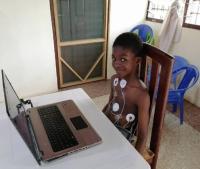
iLiNS DYAD Ghana 10-year follow-up study
Nutrients such as vitamins, minerals, and fatty acids are the building blocks for children’s healthy brain development. Much of the brain’s structure is laid during pregnancy and early childhood, when the brain and nervous system are developing very rapidly. The aim of the International Lipid-Based Nutrient Supplements (iLiNS) DYAD (mother-child dyad) Ghana 10-year follow-up study is to assess the long-term effects of lipid-based nutrient supplements provided during pregnancy and early childhood. This will be the first randomized controlled trial to assess long-term effects of early nutritional supplementation on nervous system development through combining methods to assess neurophysiology in both the central and autonomic nervous systems, including structural magnetic resonance imaging (MRI) with diffusion tensor imaging (DTI) and measures of autonomic nervous system (ANS) activity, including electrocardiogram and impedance cardiography. The project is funded by the National Institutes of Health. Co-PIs are Dr. Elizabeth Prado at UC Davis and Dr. Seth Adu-Afarwuah at the University of Ghana. Co-investigators are Dr. Paul Hastings and Dr. Amanda Guyer at UC Davis, Dr. Adom Manu and Dr. Benjamin Amponsah at the University of Ghana, and Dr. Brietta Oaks at the University of Rhode Island.
Contact: Paul Hastings, PhD
 Micronutrient Intervention Modeling (MINIMOD) project
Micronutrient Intervention Modeling (MINIMOD) project
The objective of this project is to develop and apply tools to plan and more efficiently manage national and sub-national micronutrient intervention programs in developing countries. The tools combine dietary modeling methods and program cost estimates to predict the most cost-effective combinations of programs over space and time to meet selected objectives. Model development and application to policy processes are underway in Cameroon and Ethiopia.
Contact: Reina Engle-Stone, PhD
Completed Projects:
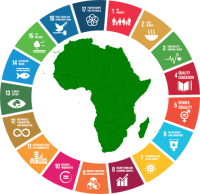
Advancing the SDGs Through UC Davis and the African Leadership University
Carrie Waterman, an assistant researcher of nutrition in the College of Agricultural and Environmental Sciences, Andrew Hargadon, a professor of technology management in the Graduate School of Management, and Rahim Reed, associate executive vice chancellor in the Office of Diversity, Equity and Inclusion, are teaming up to advance several SDGs including No Poverty (Goal 1), Zero Hunger (Goal 2), Good Health and Well-Being (Goal 3), Quality Education (Goal 4), Industry, Innovation and Infrastructure (Goal 9), Reduced Inequalities (Goal 10), Responsible Consumption and Production (Goal 12), Climate Action (Goal 13), Life Below Water (Goal 14), Life On Land (Goal 15),and Partnerships (Goal 17).
This interdisciplinary team is aiming to expand the partnership between UC Davis and African Leadership University, sparked by a previous Global Affairs Seed Grant. It combines UC Davis expertise, particularly related to food security and nutrition-sensitive agriculture, with entrepreneurial expertise and perspectives from the African Leadership University in Kigali, Rwanda, a university that educates students from more than 40 countries and has degree programs such as global challenges, entrepreneurship, and international business. Expanding this partnership will entail providing further trainings related to SDGs and African entrepreneurship, including a workshop in Rwanda. The project will also develop more faculty and student collaboration from UC Davis—including engaging African and African American students and identifying potential funding opportunities and connections in Africa.
Contact: Carrie Waterman, Ph.D.
Alive and Thrive
Alive & Thrive (A&T) is a 6-year initiative (2009-2014) to improve infant and young child nutrition by increasing rates of exclusive breastfeeding and improving complementary feeding practices. A&T aims to reach more than 16 million children under 2 years old in Bangladesh, Ethiopia, and Viet Nam. The objectives of A&T are to create delivery models in three distinct learning environments that improve IYCF practices at scale and can be replicated in other parts of the world; document impact, cost, and cost-effectiveness of IYCF interventions; foster innovation through a grants program; and disseminate learnings from A&T models, innovations, operations research, and evaluations. UC Davis oversees the small grants program and provides technical support.
Contact: Kathryn Dewey, PhD
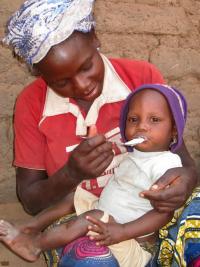
Breast Milk, Gut Microbiome and Immunity (BMMI) Project
The Breast Milk, Gut Microbiome and Immunity (BMMI) Project is designed to identify new and effective ways to diagnose, treat, and prevent disorders arising from abnormal postnatal development of the gut microbiome. The BMMI Project seeks to discover novel dietary and microbial therapeutics, targeting infants living in developing countries with rampant malnutrition. The ultimate goal of the project is to improve the healthy growth of infants and children by identifying and validating new pre- and probiotics that support, repair, or recapitulate metabolic functions carried out by the gut microbiomes.
Contact: Kathryn Dewey, PhD
Contribution of Inherited Blood Disorders to Anemia Among Children in Urban Cameroon
Information on the etiology of anemia in a population is necessary to construct public health programs that permit appropriate treatment of the affected individuals. Inherited blood disorders are assumed to be common in sub-Saharan Africa, but only limited data are available on the prevalence of these conditions and the extent to which they contribute to anemia. This project aims to assess the prevalence of selected hemoglobin variants (primarily Hb S, or sickle cell trait) and alpha-thalassemia, and the relationship of these conditions with hemoglobin concentrations, anemia, and indicators of micronutrient status. The study population is drawn from a representative survey of children 1-4 years of age in Yaoundé and Douala, Cameroon.
Contact: Reina Engle-Stone, PhD
 Early Lactation Success (ELS) Study
Early Lactation Success (ELS) Study
The Early Lactation Success (ELS) study collected data from a multi-ethnic, predominantly low-income cohort of mother-infant pairs from Sacramento, CA to understand variation in the ability of first-time mothers to successfully establish exclusive breastfeeding and to avoid breastfeeding problems. The underlying premise of the study was that the duration of exclusive breastfeeding is determined not only by psychosocial factors (such as the mother’s motivation to breastfeed and social support for breastfeeding), but by the mother’s breastfeeding experience during the first week postpartum. The study focused on first-time mothers because the incidence of early lactation difficulties is greater in this group.
Contact: Kathryn Dewey, PhD
Lao Thiamine Study
Thiamine (vitamin B1) is an essential micronutrient and thiamine deficiency can lead to a broad spectrum of clinical abnormalities, referred to as thiamine deficiency disorders (TDD), of which the classic forms of beriberi in adults are best known. We plan to implement a hospital- and community-based study in Luang Prabang, Lao PDR. The proposed study will include a group of hospitalized children 21 days to <12 months of age who are diagnosed with TDD-compatible symptoms. Based on the infants’ response to thiamine administration, children will be defined as either thiamine responsive disorder cases or non-responders. A community-based comparison group of infants in the same age range will be included in the study to serve as a control group for identification of potential risk factors.
Contact: Sonja Y Hess, PhD
Lao Zinc Study
The Lao Zinc study is a community-based, double-blind, randomized controlled trial to determine the optimal method for delivering zinc to young children, both for the prevention of zinc deficiency and the treatment of diarrhea. The impact of a new zinc-containing micronutrient powder (MNP) formulation will be compared with daily preventive zinc supplementation and therapeutic zinc supplementation during diarrhea episodes both using dispersible tablets. The impact on young children’s growth, diarrhea, acute lower respiratory infections and zinc status will be assessed.
Contact: Sonja Hess, PhD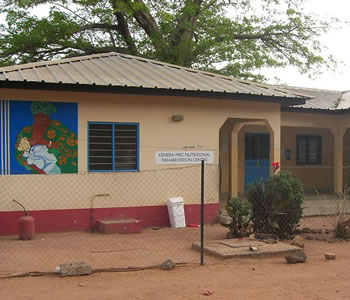
Lipid-Based Nutrient Supplements (LNS) Phytase Project
The LNS Phytase Project is designed to evaluate the efficacy of exogenous phytase added to small quantity lipid-based nutrient supplements (SQ-LNS) on the fractional and total absorption of zinc among young children in The Gambia. The study is a double-blind randomized controlled clinical trial, designed to permit within-child comparisons of zinc absorption from SQ-LNS, with or without exogenous phytase, by using the zinc triple stable-isotope ratio tracer technique.
Contact: K. Ryan Wessells, PhD
Mazira Project
Infant diets in resource-poor settings are often characterized by low diversity and poor nutrient quality, yet nutrient requirements for infants are high to meet the demands of rapid growth and development. Animal source foods, such as eggs, are nutrient-dense food sources that may improve diet quality for rapidly growing infants. The objective of the Mazira Project is to evaluate the effect of eggs introduced early in the complementary feeding period, starting when infants are 6-9 months of age, on linear growth and early child development, as well as to explore the potential metabolic pathways leading to growth, development, and health in young children.
Contact: Christine P. Stewart, PhD
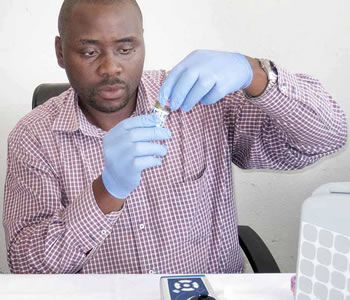
Monitoring and Evaluation of Large-Scale Food Fortification in Cameroon
Previous research by UC Davis and HKI Cameroon documented the prevalence of micronutrient deficiencies and consumption of potentially fortifiable staple foods in a national sample of women and young children in Cameroon, prior to implementation of a mandatory program to fortify refined vegetable oil with vitamin A and wheat flour with several vitamins and minerals. Post-fortification, a survey of urban areas found that unfortified samples of oil and wheat flour were present in households and markets, suggesting that efforts are needed to strengthen implementation of the program. Building upon this work, the current project aims to assess the implementation and reach of Cameroon’s food fortification program. The project will include monitoring of fortification activities at the industry level (factories and imported products) and measurement of the reach and micronutrient content of fortified products at the market and household level in sentinel sites throughout the country.
Contact: Reina Engle-Stone, PhD
 Niger Maternal Nutrition (NiMaNu) Project
Niger Maternal Nutrition (NiMaNu) Project
In partnership with two non-governmental public health organizations and the Niger Ministry of Health, researchers of the IGN aim to assess the nutritional and health status of pregnant women in the Zinder region of Niger and to understand their knowledge, attitudes and practices (KAP) related to health and nutrition during pregnancy pre- and post-intervention. Based on findings of formative research, an optimization strategy was developed to increase the coverage and quality of antenatal care services.
Contact: Sonja Hess, PhD
 Niger Optifood Project
Niger Optifood Project
For many women in sub-Saharan Africa it is particularly challenging to meet their nutrient requirements during pregnancy and lactation due to increased physiological requirements and a lack of resources. The primary objective of this study is to assess the ability of pregnant and breast-feeding women to meet their macro- and micronutrient requirements from locally available foods, considering household resource constraints and seasonal variation in food availability.
Contact: Sonja Y. Hess, PhD
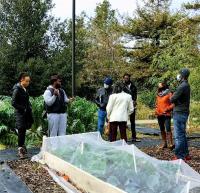
Nutrient-Dense Moringa for All Californians
Increasing consumption and production of climate-sensitive nutrient-dense specialty crops in California is imperative. Moringa oleifera (moringa) is an ideal crop in speed with California’s mission to have a healthier environment, healthier people, and prosperous farmers. While utilization of moringa at a global level is rapidly increasing, there is a vast knowledge gap in California and unmet potential for local market growth. Through presentations and intensive training, the project will sequentially increase awareness, knowledge, availability, and access of moringa to over 25,000 California residents, with a focus on underserved communities. Impact assessment of knowledge gained, taste preferences, adoption of cultivation, and consumption of moringa will be measured by quantitative and qualitative means. Results will be published as part of an online website and resource to disseminate information and connect producers with consumers, ultimately scaling the moringa industry in California.
Contact: Carrie Waterman, PhD

Prevention of Overfeeding During Infancy (PODI) Project
The Prevention of Overfeeding During Infancy (PODI) Project is studying infants from the Sacramento area and has two main objectives. First, the study aims to evaluate the impact on breastmilk or formula intake when an infant is given greater control over the amount consumed when feeding from a bottle. This will be accomplished via the use of a novel nipple that mimics (functionally) the nipple of a human breast and allows the infant to self-regulate milk flow. The second objective of the study is to determine the relationship between parental feeding styles and infant intake. The results of the study will provide important evidence regarding the reasons for the difference in intake between formula-fed and breastfed infants, which is critical for designing effective interventions to reduce overfeeding during infancy and subsequent child obesity.
Contact: Kathryn Dewey, PhD
Rang-Din Nutrition Study (RDNS)
The Rang-Din Nutrition Study (RDNS) is an effectiveness study in Bangladesh evaluating the impact of lipid-based nutrient supplements (LNS) on preventing stunting and enhancing motor and cognitive development in young children, and improving the health and nutritional status of pregnant and lactating women. The study will also assess cost and cost‐effectiveness of home fortification approaches, identify and measure some of the household and public economic benefits associated with LNS (e.g., changes in health care costs and morbidity patterns of infants and their mothers) and identify barriers and facilitators to LNS delivery that are important for potential implementation in large scale programs.
Contact: Kathryn Dewey, PhD
WASH Benefits
The WASH Benefits Study will provide rigorous evidence on the health and developmental benefits of water quality, sanitation, handwashing, and nutritional interventions during the first years of life. The study includes two, cluster-randomized controlled trials to measure the impact of intervention among newborn infants in rural Bangladesh and Kenya. The studies are large in scope (> 5,000 newborns per country) and will measure primary outcomes after two years of intervention.
Contact: Christine Stewart, PhD



